QHS Alumni Spotlight: Jerry Douglas ’70
By: Katie Rodemich ’02
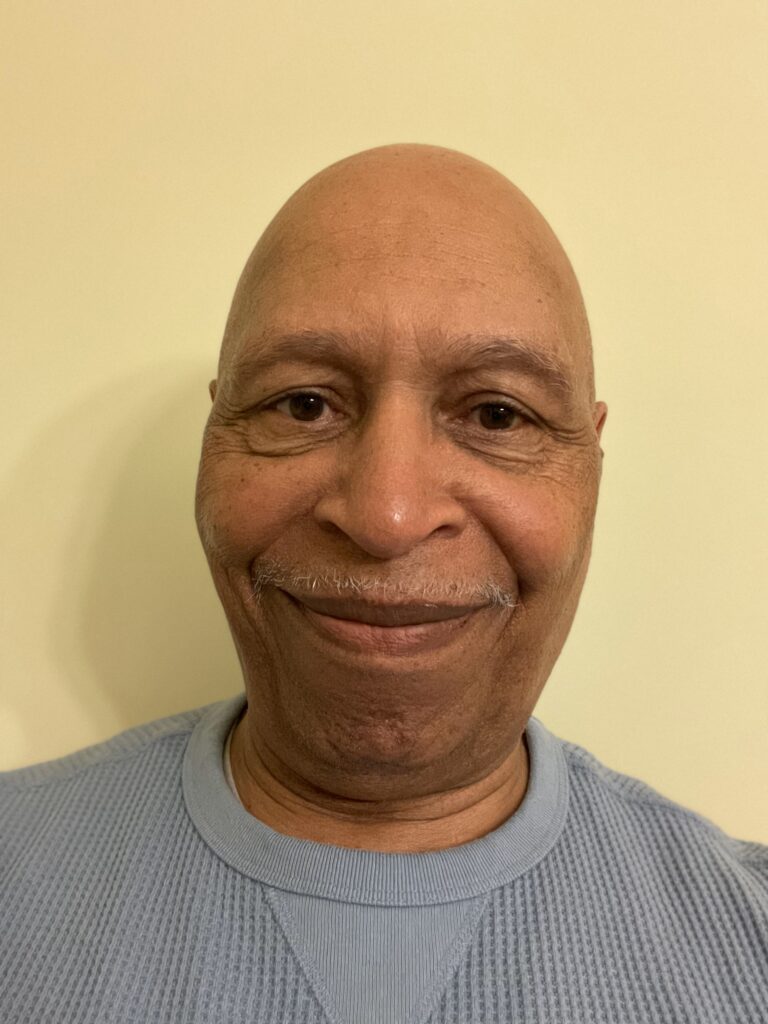
In the late 1960s, Quincy High School was a place of deep-rooted tradition, fierce competition, and an evolving spirit of change. Among its students was Jerry Douglas, a notable athlete whose impact extended beyond the basketball court. As the first of the Douglas brothers—Jerry, Darrell, Keith, Bruce and Dennis—to play varsity basketball for the QHS Blue Devils, he set a precedent for excellence. But his influence didn’t end with the final buzzer. His formative years at QHS laid the foundation for a lifetime dedicated to education, mentorship, and family—a journey defined by perseverance, community, and an unwavering commitment to uplifting others.
For Jerry, basketball wasn’t just a game—it was the heartbeat of the school and the community. Game nights in Quincy were electric. The gym was packed with fans, the energy was contagious, and every student, teacher, and family member came out to support the Blue Devils. But the excitement didn’t end at the final buzzer. After home games, students would gather for school-hosted dances, transforming nights into an unforgettable mix of competition, camaraderie, and celebration.
Reflecting on those years, Jerry recalls:
“Playing basketball, definitely—being on the varsity team and being part of it all. It was a different time. We actually used to have dances after every home game. Social life was different back then. These were school dances—chaperoned and organized—so it was a fun way for everyone to come together. Going to football games was a blast too. And of course, just hanging out with friends. I think the world felt a lot closer then. Community-wise, it was much easier to connect with your social groups and spend time together.”
The tradition of basketball at QHS shaped Jerry’s high school experience, instilling in him a deep appreciation for teamwork, leadership, and community engagement—values that would guide his career as an educator. But his success didn’t happen in isolation; it was nurtured by mentors who recognized his potential and invested in his growth.
Three educators, in particular, played a pivotal role in shaping his leadership: Dick Thompson, his eighth-grade basketball coach and math teacher; Dr. George Meyer, his health teacher and ninth-grade basketball coach; and Milt McPike, was an industrial arts teacher and also ninth grade basketball coach who later became a highly regarded principal in Milwaukee.
“Those men were all very influential as I was growing up,” Jerry shares. “Milt left Quincy to become a principal in Milwaukee, Wisconsin and he was very well-respected. George and I are still close friends to this day. Dick Thompson and I even served together on the trustee board at The Crossing.”
Inspired by his mentors, Jerry pursued a degree from Western Illinois University and began teaching in Quincy Public Schools in 1974. His early years as an educator were spent at Quincy Senior High School.
“I always liked school. When you spend 12 years somewhere, it helps if you enjoy it. History was my subject, though I also enjoyed math and English. Science wasn’t my favorite—I did fine in it, but it never excited me. I also took industrial arts, but I always preferred teaching and instructing.”
Jerry’s career later took him on a diverse path beyond education, leading to a decade in the corporate world with Sears, which relocated his family to Minneapolis, Peoria, and St. Louis. Yet, his passion for education never wavered. In 1986, he returned to teaching, this time at a church-affiliated school in St. Peters, Missouri.
For Jerry, teaching wasn’t just a profession—it was a calling. He believed in building relationships with students, pushing them to see their potential, and helping them develop the confidence to succeed. His influence extended beyond academics; he encouraged students to set goals, pursue higher education, and find their own paths to success.
“My life has been divided into two major parts,” Jerry reflected. “Before I came into a personal, intimate relationship with Jesus Christ, I was not focused on what I wanted to do and become. But after coming to know Him, I became very focused that my life was meant for teaching, coaching, and mentoring kids. My love for both children and teaching are a direct reflection of my relationship with the Lord.”
In the early 1990s, Jerry and his family moved back to Quincy, where he resumed his role in the Quincy School District at Quincy Junior High School. His second teaching stint lasted from 1994 to 2000, further cementing his legacy as a dedicated teacher and mentor.
Later, he pursued a master’s degree in education, which opened the door to his next chapter—serving as the Director of Education at Chaddock for 17 years. There, he worked with students in residential treatment programs, helping at-risk youth find stability, structure, and confidence. Even after retiring from Chaddock in 2017, Jerry wasn’t finished. He spent five more years teaching at QPS’s The Academy, ensuring that students in need of extra support received the education they deserved.
“Being a child of the sixties and an African American, education was incredibly important—it was a crucial avenue for advancing choices, decisions, and opportunities. Growing up in that era, it was clear that getting an education was essential. School mattered. Sharing that belief was what led me to become a teacher—passing on that vision was deeply important to me. And to this day, I still believe that education is the most important thing that happens in any of our lives.”
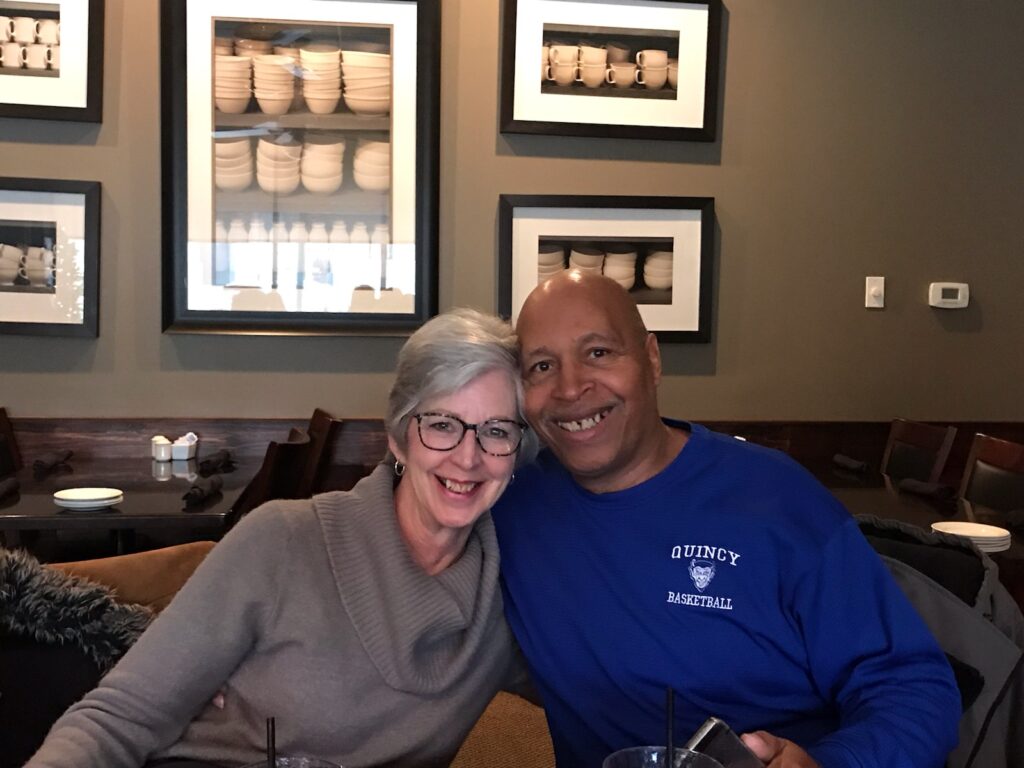
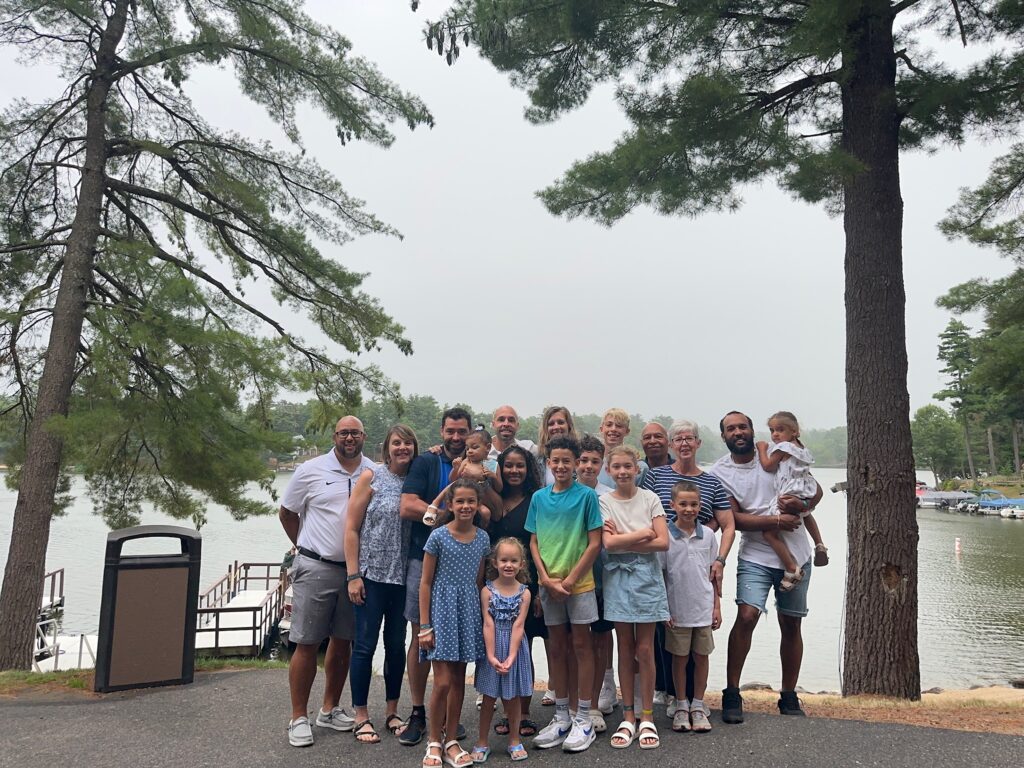
The Douglas family were built on education and athletics. Jerry’s commitment to mentorship and leadership didn’t stop in the classroom—it became the very foundation of his family life. Jerry is married to Trish, and together they built a lifelong partnership rooted in shared values and a dedication to helping others grow. For over fifty years, they have nurtured both their commitment to learning and their family, raising their sons- Andy, Tony, Aaron, and Alex with the principles of hard work, perseverance, and excellence. Their home was centered around education, but sports were woven into everyday life, shaping their children’s futures in profound ways. Today, their influence extends to their ten grandchildren, continuing the Douglas family legacy of leadership, learning, and athletic achievement.
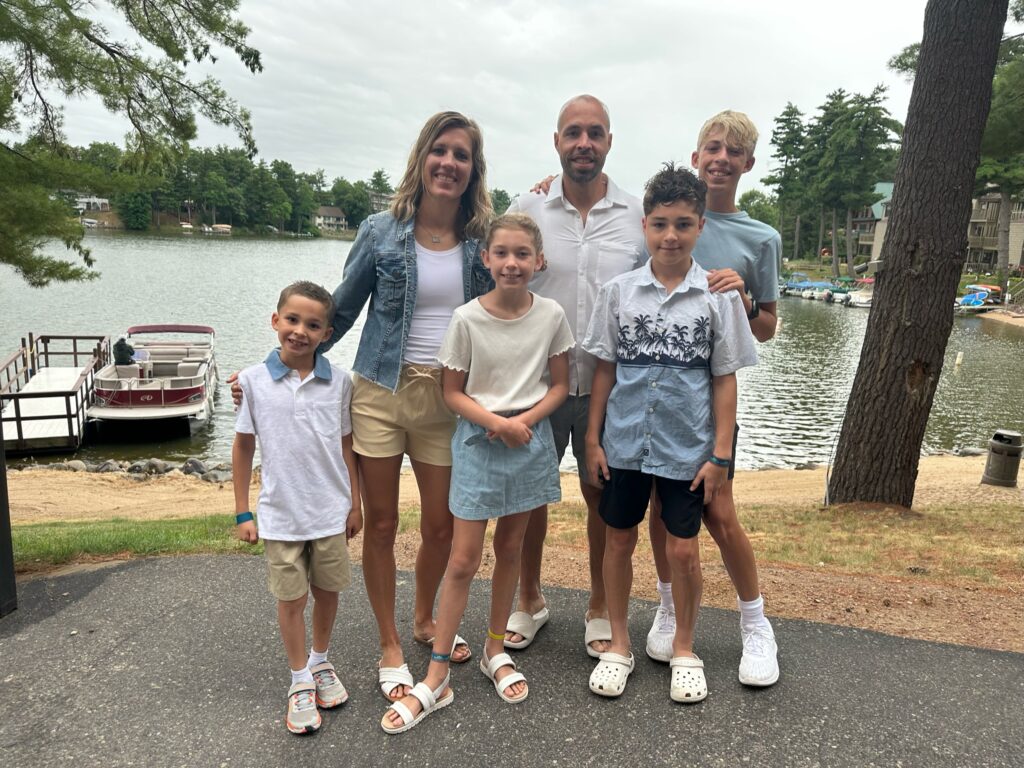
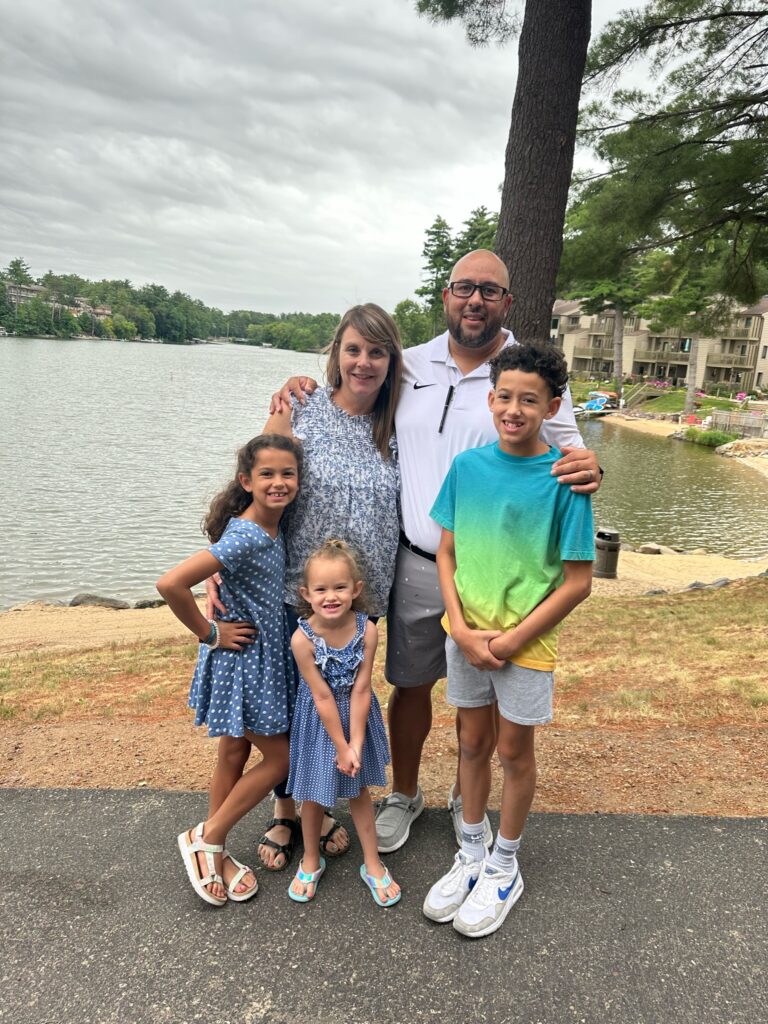
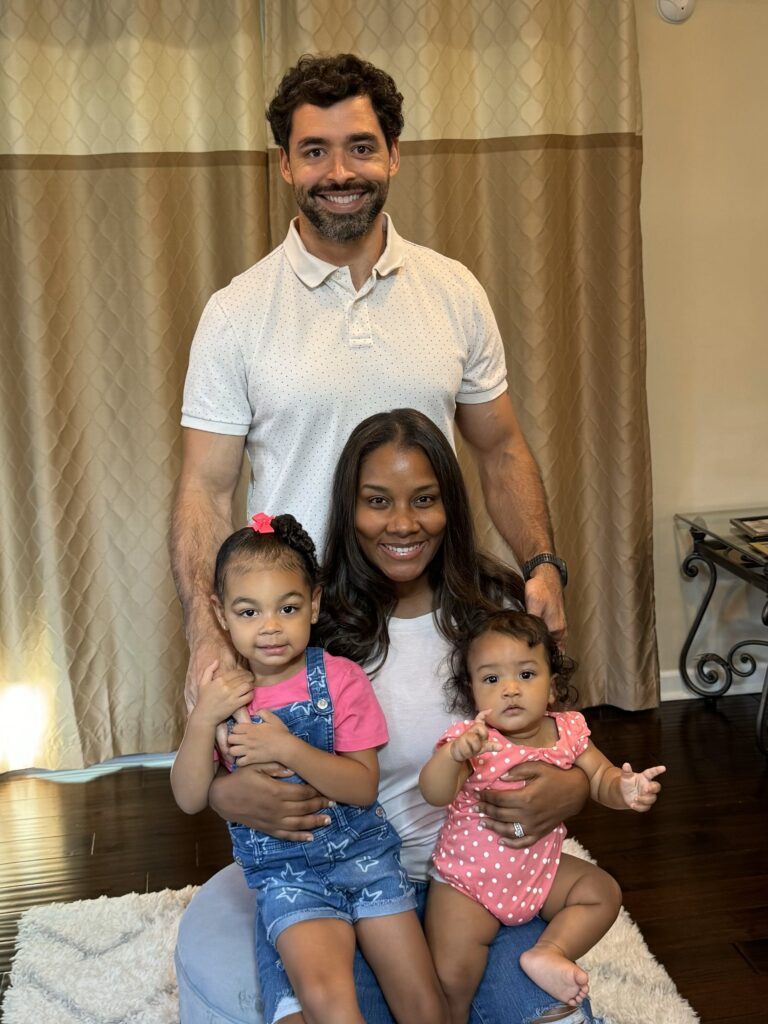
From a young age, Andy ’00 was immersed in conversations about basketball, coaching, and perseverance. Like his father, Andy became a standout athlete, but he soon discovered that his true calling wasn’t just playing the game—it was teaching it.
Now, as the head coach of Quincy High School’s basketball team, Andy carries on his father’s legacy of leadership. Under his guidance, the QHS Blue Devils Boys Basketball continue to uphold the deep tradition of Quincy basketball—a program built on discipline, teamwork, and heart.
Though his father may no longer be on the sidelines, his influence remains. Jerry’s wisdom, values, and love for the game live on in every practice, every huddle, and every young player Andy now mentors. His legacy isn’t just in the wins or championships but in the lessons passed down from one generation to the next proving that great coaching is about far more than the sport itself.
“We didn’t make it to state during my time. My junior year, we lost in the super-sectional game—had we won, we would have advanced to state. Looking at Quincy’s basketball history, there’s a strong tradition of success,” Jerry reflects
“I told Andy years ago that life follows the principle of sowing and reaping. Sometimes, people manage to reap rewards before they truly sow, but the real process requires putting in the work first. Andy has been sowing for years, and now he’s finally beginning to reap the fruits of his labor.”
Still, Jerry has no plans to slow down or retire anytime soon as he continues dedicated to mentorship. In 2021, Verti-GO Quincy: Speed and Agility Training was launched in Quincy, Illinois, driven by a shared passion for helping young athletes develop confidence and skills beyond natural talent. Founded by his son and QHS Alumni track star Tony Douglas ‘01, the facility focuses on enhancing athletes’ speed, agility, and reaction times through specialized training programs. The Quincy location opened as an extension of Tony’s original facility in Des Moines, Iowa. The vision came to life under the leadership of Tony, whose journey as an athlete and coach served as the inspiration for the program’s creation.
With a focus on speed, agility, and overall performance, Verti-Go is more than just a training facility. Many once believed that elite competitors were simply “born that way.” Determined to change that mindset, Tony and Jerry set out to create a training program where anyone—athletic or non-athletic—could improve through structured coaching.
“It’s a program designed to help kids develop athletic skills decreed Jerry. People often assume that the best athletes are simply born that way. Many believe that if a kid isn’t naturally fast or quick, they never will be. But we see it differently—just like with education. The smartest kids didn’t wake up that way; they practiced, learned, and put in the effort to improve. That’s the philosophy behind Vertigo. No matter where a child starts, we work with them to build strong athletic skills. Over time, they’ll see improvement in speed, quickness, vertical jump, lateral movement, and reaction time.”
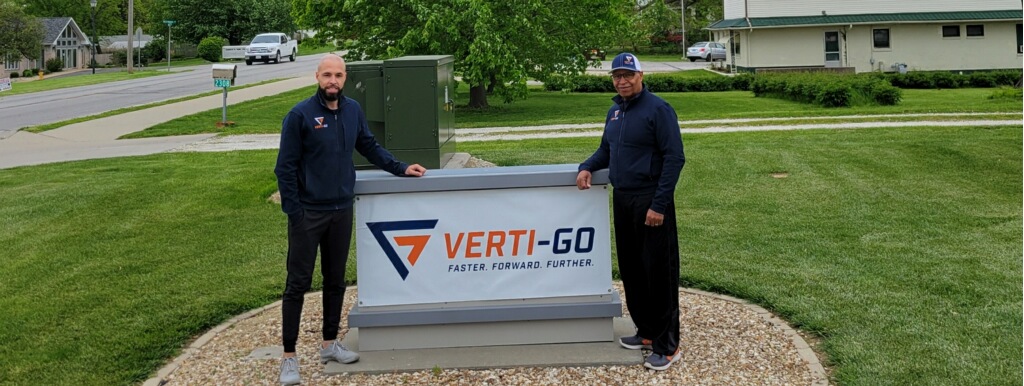
Verti-Go’s training is data-driven and personalized, helping athletes track their progress in measurable ways. The program focuses on: Speed Development – Improving acceleration and running form for greater efficiency. Agility Training – Enhancing footwork, lateral movement, and reaction time. Jump Mechanics – Teaching proper form to increase vertical leap and explosive movement. Strength Conditioning – Developing power and endurance while prioritizing injury prevention.
“At Verti-Go, we serve three distinct groups. First, young athletes focused on enhancing their skills, agility, and overall athletic performance.
Second, we offer a wellness program for adults, designed for overall health rather than competition. These 30- to 40-minute workouts prioritize movement, mobility, and a moderate heart rate increase—helping participants stay active without exhaustion or injury. Understanding their busy lives, our goal is to provide sustainable, effective fitness.
Lastly, our wellness group for kids, including students from The Academy, emphasizes more than just physical fitness. It promotes mental, social, and emotional well-being, helping kids sleep better, stay focused, and feel balanced. This program instills the idea that exercise is a lifelong tool for overall wellness.”
“While I focus on improving their athleticism, my primary goal is helping them develop life skills, particularly in goal setting. When they come in, we talk about setting and achieving goals, understanding that school always comes first. That’s the most important message I emphasize—success in school is the foundation for everything else. Most of the kids who train here already value their education, but with the Academy students, I make it a constant focus. Academic success will take them the farthest and provide the greatest benefits in life.”
The program attracts kids from a wide range of communities, with a fairly even split between QND and QPS students. Its reach extends beyond Quincy, including participants from Hannibal, Keokuk, Hamilton, Pittsfield, Mendon, Camp Point, and Liberty. It operates as a regional program, drawing families from within a 45- to 50-minute drive of Mount Sterling.
“My hope is that there are kids out there who could be playing sports and who could be doing and achieving a lot better results if they trained with Verti-Go Quincy. We focus on athletic performance, while coaches work on sport-specific skills. At basketball practice, for example, athletes refine their basketball techniques, but when they train here, they develop the foundational athletic skills that enhance overall performance.”
Recognizing the importance of starting young, Verti-Go Quincy has expanded its offerings by launching The Kids Academy, a program designed for children ages 5 to 7 who are just beginning to explore athletics. The Kids Academy focuses on building fundamental skills through structured but playful training, ensuring that young athletes develop proper movement mechanics, balance, and coordination before advancing to more competitive sports.
By starting kids young, The Kids Academy helps prevent bad habits in movement and implements a love for athletics from an early age. This program also introduces young athletes to a structured sports environment, easing their transition into organized team sports in later years.
Verti-Go isn’t just for young kids—it has trained high school, college, adults and even professional athletes. Some have gone on to play in collegiate sports, while others have pursued professional careers overseas.
Through his career, his children’s leadership, and the countless students he has mentored, Jerry Douglas has sown seeds that continue to grow—one lesson, one game, one life at a time. And that, more than any trophy or title, is his greatest victory.
Learn more about Verti-Go Quincy!
NOMINATE A BLUE DEVIL
We want to hear from you! Visit bit.ly/QHS-Feature to nominate fellow Blue Devils you want featured in our upcoming newsletters!
READ MORE ALUMNI SPOTLIGHTS
To read more QHS Alumni Spotlights, visit qpsfoundation.org/alumni-spotlights.

